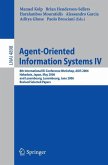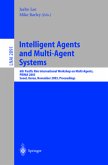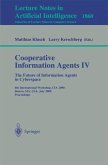Matthias Klusch / Michael Rovatsos / Terry R. Payne (eds.)10th International Workshop, CIA 2006, Edinburgh, UK, September 11-13, 2006, Proceedings
Cooperative Information Agents X
10th International Workshop, CIA 2006, Edinburgh, UK, September 11-13, 2006, Proceedings
Herausgegeben:Klusch, Matthias; Rovatsos, Michael; Payne, Terry R.
Matthias Klusch / Michael Rovatsos / Terry R. Payne (eds.)10th International Workshop, CIA 2006, Edinburgh, UK, September 11-13, 2006, Proceedings
Cooperative Information Agents X
10th International Workshop, CIA 2006, Edinburgh, UK, September 11-13, 2006, Proceedings
Herausgegeben:Klusch, Matthias; Rovatsos, Michael; Payne, Terry R.
- Broschiertes Buch
- Merkliste
- Auf die Merkliste
- Bewerten Bewerten
- Teilen
- Produkt teilen
- Produkterinnerung
- Produkterinnerung
This book constitutes the refereed proceedings of the 10th International Workshop on Cooperative Information Agents, CIA 2006, held in Edinburgh, UK in September 2006. The 29 revised full papers presented together with four invited papers were carefully reviewed and selected from 58 submissions. The papers are organized in topical sections.
Andere Kunden interessierten sich auch für
![Cooperative Information Agents XI Cooperative Information Agents XI]() Matthias Klusch (Volume ed.) / Koen Hindriks / Mike P. Papazoglou / Leon SterlingCooperative Information Agents XI41,99 €
Matthias Klusch (Volume ed.) / Koen Hindriks / Mike P. Papazoglou / Leon SterlingCooperative Information Agents XI41,99 €![Agent-Oriented Information Systems IV Agent-Oriented Information Systems IV]() Agent-Oriented Information Systems IV41,99 €
Agent-Oriented Information Systems IV41,99 €![Agent Communication II Agent Communication II]() Frank Dignum / Rogier van Eijk / Roberto FloresAgent Communication II42,99 €
Frank Dignum / Rogier van Eijk / Roberto FloresAgent Communication II42,99 €![Intelligent Agents and Multi-Agent Systems Intelligent Agents and Multi-Agent Systems]() Jaeho Lee / Mike Barley (eds.)Intelligent Agents and Multi-Agent Systems42,99 €
Jaeho Lee / Mike Barley (eds.)Intelligent Agents and Multi-Agent Systems42,99 €![Cooperative Information Agents VII Cooperative Information Agents VII]() Matthias Klusch / Sascha Ossowski / Andrea Omicini / Heimo Laamanen (eds.)Cooperative Information Agents VII42,99 €
Matthias Klusch / Sascha Ossowski / Andrea Omicini / Heimo Laamanen (eds.)Cooperative Information Agents VII42,99 €![Cooperative Information Agents IV - The Future of Information Agents in Cyberspace Cooperative Information Agents IV - The Future of Information Agents in Cyberspace]() Matthias Klusch / Larry Kerschberg (eds.)Cooperative Information Agents IV - The Future of Information Agents in Cyberspace42,99 €
Matthias Klusch / Larry Kerschberg (eds.)Cooperative Information Agents IV - The Future of Information Agents in Cyberspace42,99 €![Engineering Societies in the Agents World VI Engineering Societies in the Agents World VI]() Oguz Dikenelli / Marie-Pierre Gleizes / Alessandro Ricci (eds.)Engineering Societies in the Agents World VI42,99 €
Oguz Dikenelli / Marie-Pierre Gleizes / Alessandro Ricci (eds.)Engineering Societies in the Agents World VI42,99 €-
-
-
This book constitutes the refereed proceedings of the 10th International Workshop on Cooperative Information Agents, CIA 2006, held in Edinburgh, UK in September 2006. The 29 revised full papers presented together with four invited papers were carefully reviewed and selected from 58 submissions. The papers are organized in topical sections.
Hinweis: Dieser Artikel kann nur an eine deutsche Lieferadresse ausgeliefert werden.
Hinweis: Dieser Artikel kann nur an eine deutsche Lieferadresse ausgeliefert werden.
Produktdetails
- Produktdetails
- Lecture Notes in Computer Science 4149
- Verlag: Springer / Springer Berlin Heidelberg / Springer, Berlin
- Artikelnr. des Verlages: 11839354, 978-3-540-38569-1
- 2006
- Seitenzahl: 496
- Erscheinungstermin: 30. August 2006
- Englisch
- Abmessung: 235mm x 155mm x 27mm
- Gewicht: 742g
- ISBN-13: 9783540385691
- ISBN-10: 354038569X
- Artikelnr.: 20946267
- Herstellerkennzeichnung Die Herstellerinformationen sind derzeit nicht verfügbar.
- Lecture Notes in Computer Science 4149
- Verlag: Springer / Springer Berlin Heidelberg / Springer, Berlin
- Artikelnr. des Verlages: 11839354, 978-3-540-38569-1
- 2006
- Seitenzahl: 496
- Erscheinungstermin: 30. August 2006
- Englisch
- Abmessung: 235mm x 155mm x 27mm
- Gewicht: 742g
- ISBN-13: 9783540385691
- ISBN-10: 354038569X
- Artikelnr.: 20946267
- Herstellerkennzeichnung Die Herstellerinformationen sind derzeit nicht verfügbar.
Invited Contributions.- Semantic Web Research Anno 2006: Main Streams, Popular Fallacies, Current Status and Future Challenges.- A Research Agenda for Agent-Based Service-Oriented Architectures.- The Helpful Environment: Distributed Agents and Services Which Cooperate.- Voting in Cooperative Information Agent Scenarios: Use and Abuse.- Agent Based Information Provision.- Agents for Information-Rich Environments.- Information Agents for Optimal Repurposing and Personalization of Web Contents in Semantics-Aware Ubiquitous and Mobile Computing Environments.- Turn Taking for Artificial Conversational Agents.- Inducing Perspective Sharing Between a User and an Embodied Agent by a Thought Balloon as an Input Form.- Applications.- Agent-Based Analysis and Support for Incident Management.- A Distributed Agent Implementation of Multiple Species Flocking Model for Document Partitioning Clustering.- Coverage Density as a Dominant Property of Large-Scale Sensor Networks.- Agents and Services.- Selecting Web Services Statistically.- Conversation-Based Specification and Composition of Agent Services.- Evaluating Dynamic Services in Bioinformatics.- Learning.- A Classification Framework of Adaptation in Multi-Agent Systems.- Market-Inspired Approach to Collaborative Learning.- Improving Example Selection for Agents Teaching Ontology Concepts.- Resource and Task Allocation.- Egalitarian Allocations of Indivisible Resources: Theory and Computation.- Iterative Query-Based Approach to Efficient Task Decomposition and Resource Allocation.- Multilevel Approach to Agent-Based Task Allocation in Transportation.- Rational Cooperation (1).- Learning to Negotiate Optimally in Non-stationary Environments.- Eliminating Interdependencies Between Issues for Multi-issue Negotiation.- The Distortion of Cardinal Preferences in Voting.- Rational Cooperation (2).- Risk-Bounded Formation of Fuzzy Coalitions Among Service Agents.- A Simple Argumentation Based Contract Enforcement Mechanism.- A Fuzzy Approach to Reasoning with Trust, Distrust and Insufficient Trust.- Communication and Cooperation.- Performative Patterns for Designing Verifiable ACLs.- Enabling Mobile Agents Interoperability Through FIPA Standards.- Characterising Agents' Behaviours: Selecting Goal Strategies Based on Attributes.- A Framework of Cooperative Agents with Implicit Support for Ontologies.- Specifying Protocols for Knowledge Transfer and Action Restriction in Multiagent Systems.- Agent Based Grid Computing.- Flexible Service Composition.- Using Electronic Institutions to Secure Grid Environments.
Invited Contributions.- Semantic Web Research Anno 2006: Main Streams, Popular Fallacies, Current Status and Future Challenges.- A Research Agenda for Agent-Based Service-Oriented Architectures.- The Helpful Environment: Distributed Agents and Services Which Cooperate.- Voting in Cooperative Information Agent Scenarios: Use and Abuse.- Agent Based Information Provision.- Agents for Information-Rich Environments.- Information Agents for Optimal Repurposing and Personalization of Web Contents in Semantics-Aware Ubiquitous and Mobile Computing Environments.- Turn Taking for Artificial Conversational Agents.- Inducing Perspective Sharing Between a User and an Embodied Agent by a Thought Balloon as an Input Form.- Applications.- Agent-Based Analysis and Support for Incident Management.- A Distributed Agent Implementation of Multiple Species Flocking Model for Document Partitioning Clustering.- Coverage Density as a Dominant Property of Large-Scale Sensor Networks.- Agents and Services.- Selecting Web Services Statistically.- Conversation-Based Specification and Composition of Agent Services.- Evaluating Dynamic Services in Bioinformatics.- Learning.- A Classification Framework of Adaptation in Multi-Agent Systems.- Market-Inspired Approach to Collaborative Learning.- Improving Example Selection for Agents Teaching Ontology Concepts.- Resource and Task Allocation.- Egalitarian Allocations of Indivisible Resources: Theory and Computation.- Iterative Query-Based Approach to Efficient Task Decomposition and Resource Allocation.- Multilevel Approach to Agent-Based Task Allocation in Transportation.- Rational Cooperation (1).- Learning to Negotiate Optimally in Non-stationary Environments.- Eliminating Interdependencies Between Issues for Multi-issue Negotiation.- The Distortion of Cardinal Preferences in Voting.- Rational Cooperation (2).- Risk-Bounded Formation of Fuzzy Coalitions Among Service Agents.- A Simple Argumentation Based Contract Enforcement Mechanism.- A Fuzzy Approach to Reasoning with Trust, Distrust and Insufficient Trust.- Communication and Cooperation.- Performative Patterns for Designing Verifiable ACLs.- Enabling Mobile Agents Interoperability Through FIPA Standards.- Characterising Agents' Behaviours: Selecting Goal Strategies Based on Attributes.- A Framework of Cooperative Agents with Implicit Support for Ontologies.- Specifying Protocols for Knowledge Transfer and Action Restriction in Multiagent Systems.- Agent Based Grid Computing.- Flexible Service Composition.- Using Electronic Institutions to Secure Grid Environments.








